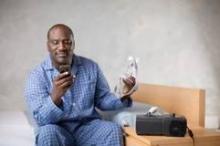A free app to help patients with obstructive sleep apnea become accustomed to using continuous positive airway pressure improved adherence during the first 11 weeks of therapy in a randomized, controlled trial with 61 patients.
The mean percentage of nights in which patients used continuous positive airway pressure (CPAP) for at least 4 hours was significantly higher in the 30 patients randomized to usual care plus use of the SleepMapper app (54%), compared with the 31 patients in the control group who got usual care alone (37%), Karen Sheikh reported at the annual meeting of the Associated Professional Sleep Societies in Minneapolis.
Patients in the app group also used the CPAP device for significantly more nights, compared with the control group – an average of 78% of nights vs. 55%, respectively, said Ms. Sheikh of the research arm of Linthicum, Md.–based Respira, a durable medical equipment company that sponsored the study. Dr. Jordanna M. Hostler of Walter Reed National Medical Center, Bethesda, Md., led the study, which was conducted at Walter Reed (Sleep 2014;37:A106-7).
All patients used the same kind of CPAP equipment and were introduced to the therapy through a 4-hour group session, lectures giving an overview of obstructive sleep apnea, CPAP, and good sleep habits, and a follow-up appointment with a respiratory therapist 30 days later, according to Ms. Sheikh.
The 17% improvement in the SleepMapper group, compared with the control group, in nights in which CPAP was used for at least 4 hours was seen after the influences of maximum PAP pressure and sleep efficiency were controlled for, she reported.
The app can be used with any CPAP equipment made by Philips, the company that developed SleepMapper, according to Mark S. Aloia, Ph.D. In addition to providing information about PAP devices, the app individualizes feedback for patients about their adherence using algorithms based on psychological theories of behavior change.
SleepMapper also performed well in a separate retrospective study of 15,242 patients released by Philips. Compared with 7,601 patients who received standard care without the app, the 7,641 patients using SleepMapper were significantly more likely to be adhering to CPAP therapy in the first 90 days of therapy (78% vs. 56%, respectively).
Among the 12% of app users and 32% of the control group who were considered "struggling users" because they used CPAP an average of fewer than 2 hours per night during the first 2 weeks, 33% of strugglers in the app group and 11% of strugglers in the control group went on to meet CPAP adherence criteria set by the Centers for Medicare & Medicaid Services, according to Philips.
"We are confident that our study demonstrates that SleepMapper can improve patient lives at a population level," Dr. Aloia of Denver, who is senior director of global clinical research for Philips Healthcare, said in an e-mail interview.
Other sleep-related apps – and there are thousands – may not be as effective.
Pulmonologist Ambra Ferraris reported in a separate presentation at the Sleep 2014 meeting that results from the Sleep Time app (by Azumio) for iPhones did not correlate with in-laboratory polysomnography results in a pilot trial in 12 healthy volunteers. The Sleep Time app is not accurate enough for clinical use, suggested Dr. Ferraris of the New Jersey Neuroscience Institute at JFK Medical Center, Seton Hall University, South Orange, N.J.
The Sleep Time app (free or $1.99 version) uses the iPhone’s accelerometer to detect the sleeper’s movements during the night and claims to adjust the wake-up time that the user has set in the phone’s alarm clock so that the alarm goes off during the lightest sleep phase and the person wakes up refreshed instead of groggy.
In the study, volunteers simultaneously used the app and underwent polysomnography in the lab. There was no correlation between the two sets of results for sleep efficiency, percentage of light or deep sleep, or sleep latency, according to Dr. Ferraris's abstract. The app’s overall accuracy was 46% (Sleep 2014;37:A367-8), though it’s unclear whether the app or the smartphones were to blame for the poor accuracy, she said in an e-mail interview.
Ms. Sheikh reported that the investigators in the SleepMapper study had no disclosures. Dr. Aloia works for Philips Healthcare, which markets SleepMapper. Dr. Ferraris reported having no disclosures.
On Twitter @sherryboschert


